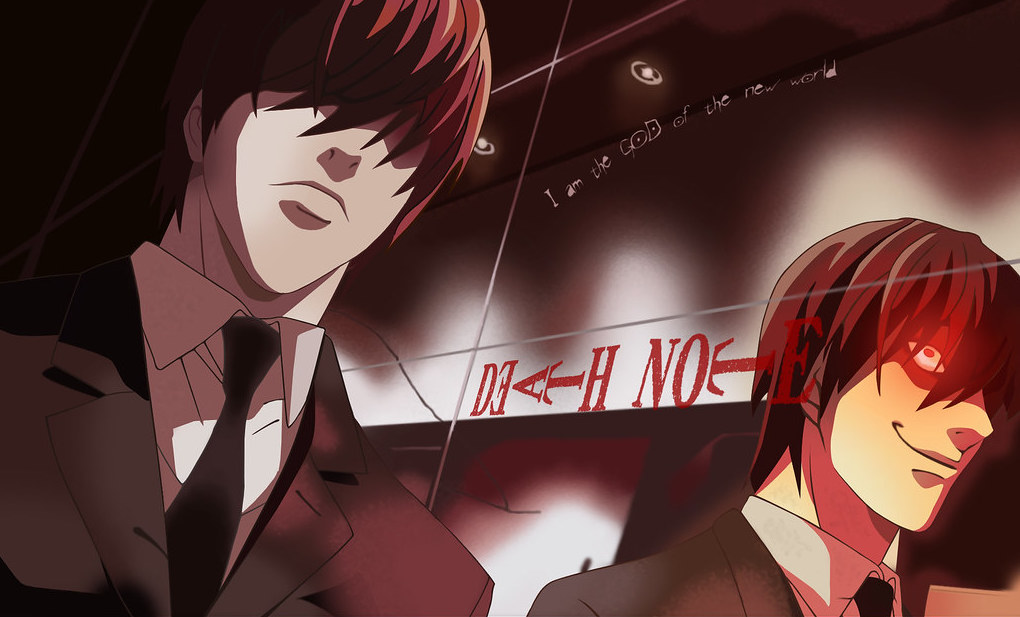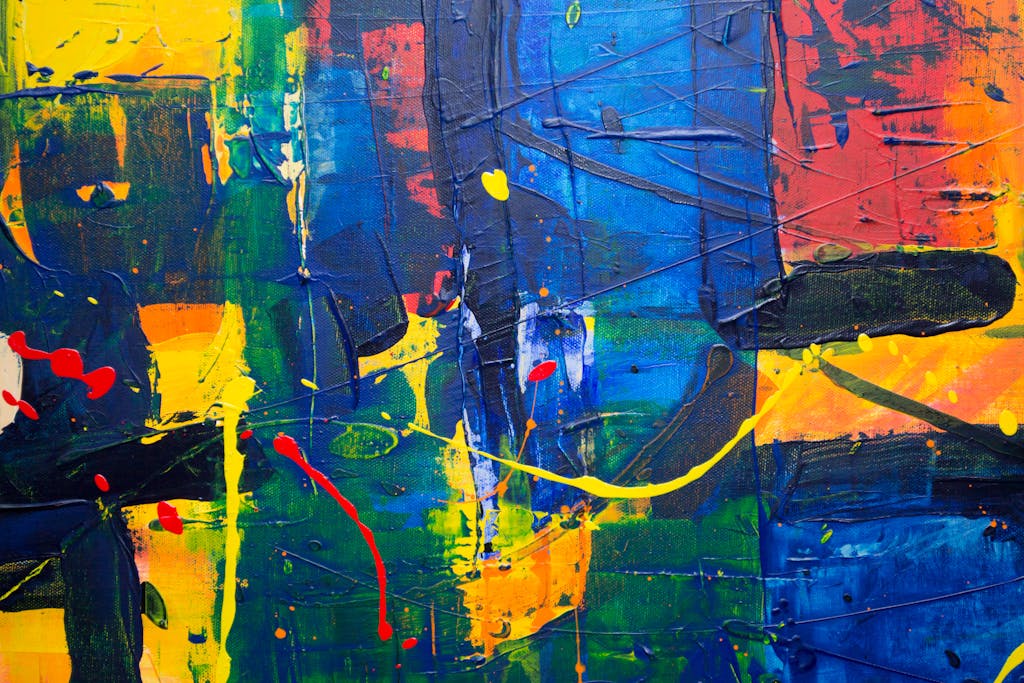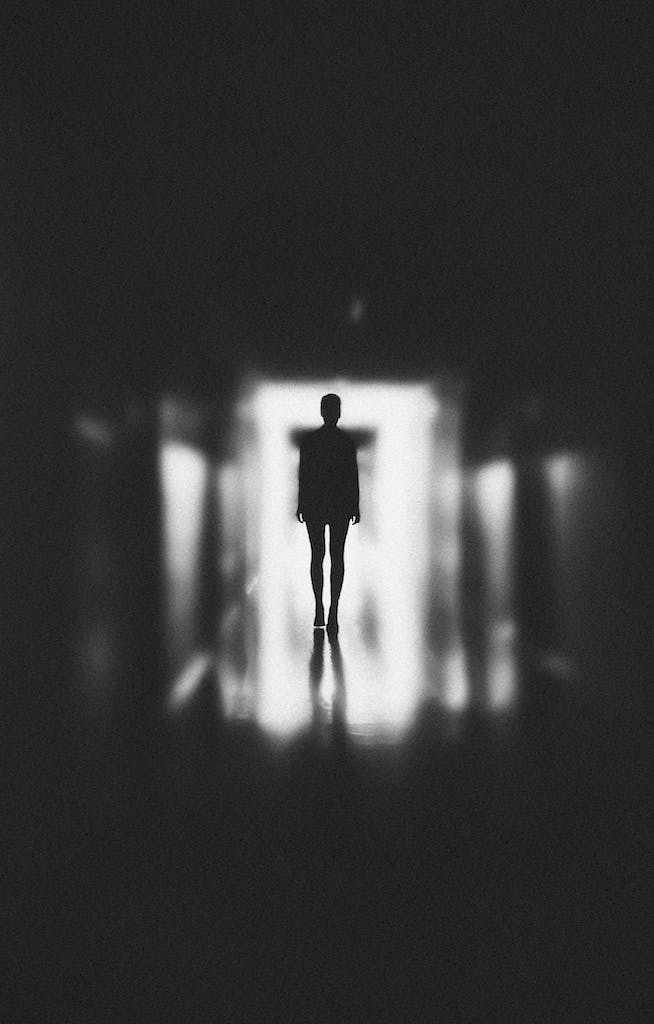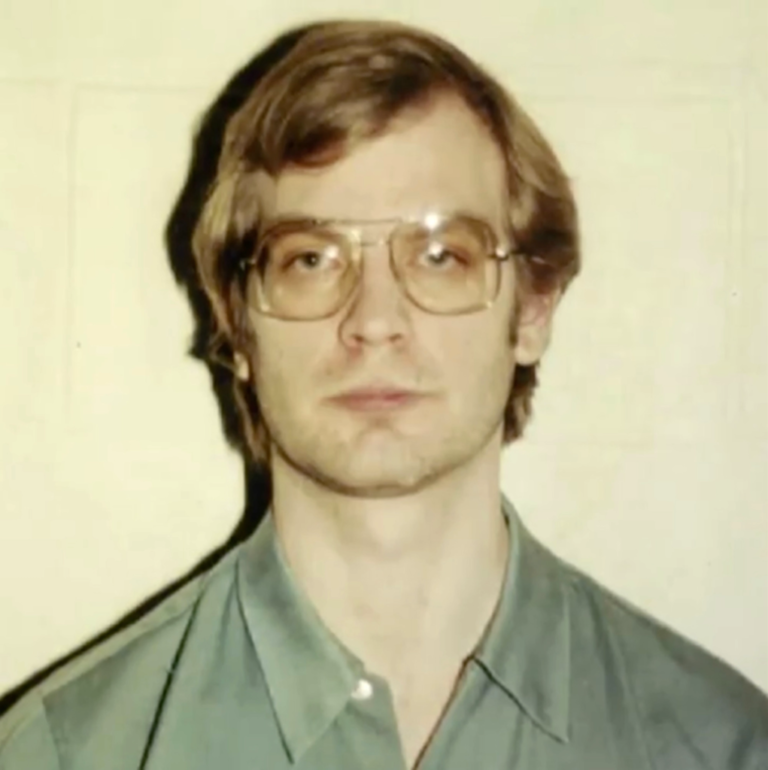Death Note: A Psychological Analysis
Death Note is a captivating manga series with a strong sense of psychological depth. The story follows the journey of Light Yagami, a gifted protagonist who believes he is destined to use a supernatural notebook that can kill anyone whose name is written in it.
As the series progresses, we witness the development of an intricate plot that delves into the complex themes of morality, justice, and the human psyche. This article will provide a comprehensive analysis of Death Note, exploring its main characters, symbolism, and themes of good and evil, as well as its adaptations and creators.
Story Overview
A supernatural notebook grants its user the power to take the lives of anyone whose name is written in it – a power that quickly falls into the hands of a high school student intent on creating a new world order. This leads to a thrilling game of cat and mouse with a mysterious detective and the consequences of such power are explored in a thought-provoking manner.
The supernatural element of the story adds an extra layer of intrigue. The notebook is not just an instrument, but a character with its own rules and limitations that the protagonist must navigate. This creates a dynamic of tension and suspense that keeps readers engaged.
At its core, Death Note is a masterful exploration of the human psyche and the consequences of power. Did Light get corrupted by the power of the Death Note? Or was he already a psychopath since the beginning? That’s what a lot of people ask themselves once they finish the anime or manga. Whether you are a fan of manga or looking for an enthralling psychological thriller, this is a must-read.
From the battle of wits between Light and L to the moral quandaries of having such a potent tool, Death Note is sure to captivate its readers. This captivating story is not only a riveting read, but a thought-provoking experience that will stay with you long after you finish.

Main Characters
The supernatural power of the mysterious note has ensnared a brilliant high school student, Light Yagami, in a dangerous game of death. Believing in the divine law that those with their name inscribed will succumb, Light embarks on a quest to purify the world of criminals. At first, he appears to be a smart and ambitious youth, yet as the story progresses his true colors are revealed – a manipulative figure with god-like tendencies.

In opposition to Light stands L, the talented detective tasked to uncover and end Kira’s rule. An enigmatic individual who shrouds himself in darkness, L is a genius whose peculiar thinking enables him to solve complex cases. The two characters enter a thrilling chase, as they battle each other in a deadly cat-and-mouse game. Other significant characters include Misa Amane, a famous model and actress entwined in Light’s affairs, and Ryuk, the Shinigami responsible for the note’s existence.
Symbolism and References
The complexity of the narrative in Death Note is enriched through the use of symbolism and references. Christian iconography is heavily featured throughout the series, from Light Yagami’s name being a play on words of light and night god to the Death Note itself being referred to as the Book of Life. Likewise, literature serves as a source of inspiration for the development of the characters, with Light Yagami being heavily influenced by the novel Crime and Punishment and the detective L being inspired by Sherlock Holmes.
The power of the Death Note, as well as its capacity to corrupt, is a recurring theme in the series. Light Yagami’s transformation from a normal high school student to a god-like figure is a reflection of the corrupting influence of power. Additionally, the series examines how authority figures, such as Light’s father Soichiro, can be corrupted by power. These themes contribute to the exploration of morality and the consequences of one’s actions, offering a thought-provoking narrative experience for viewers.
The use of symbolism, literature and themes of power and corruption in Death Note all contribute to the depth of its story. Light Yagami’s struggle between good and evil is further complicated by the religious and literary references present, while the exploration of power and its corrupting influence add to the complexity of the narrative. These elements, combined with the engaging characters and plot, make Death Note an excellent example of a thought-provoking anime series.
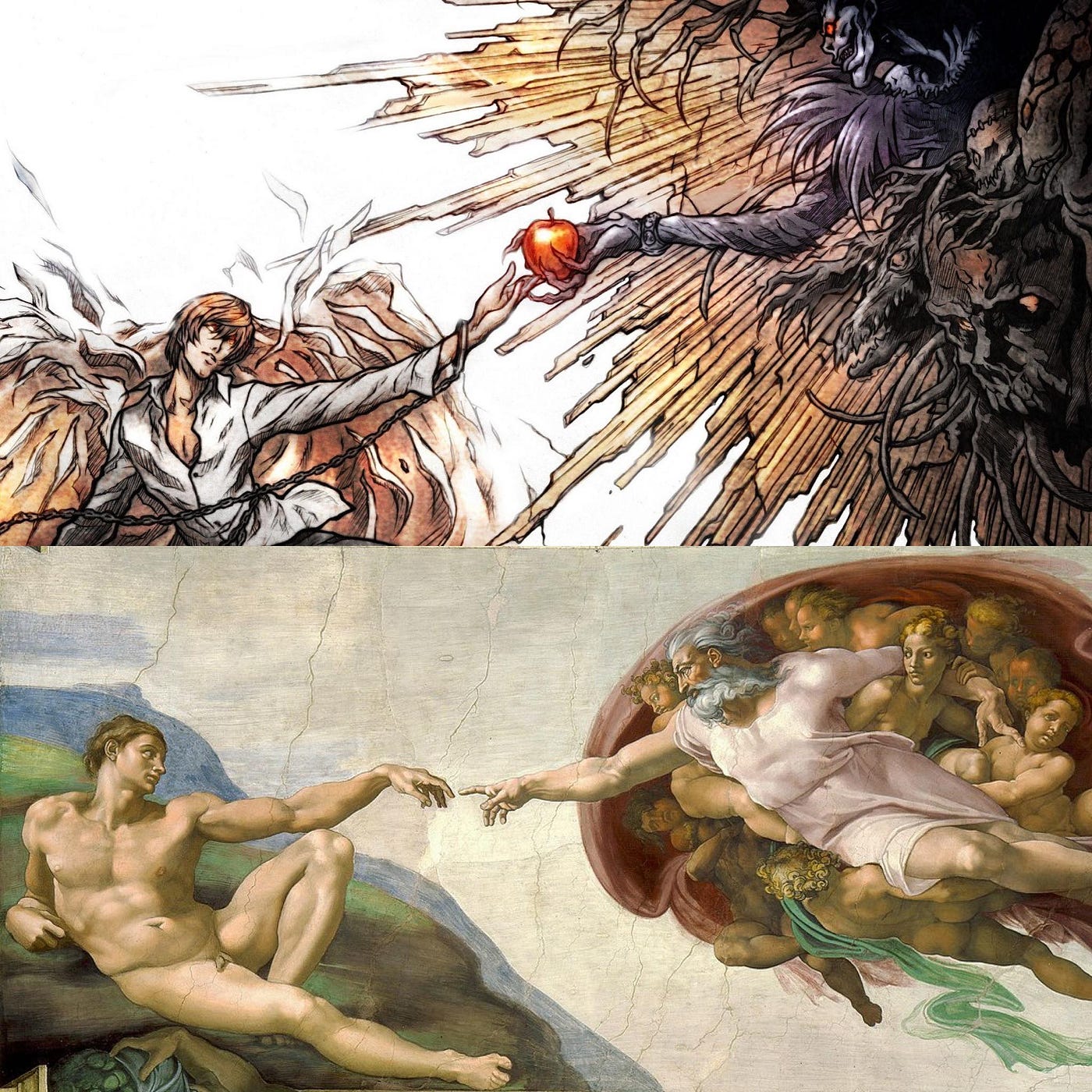
Themes of Good and Evil
The narrative of Death Note forces its audience to dwell upon the complexities between good and evil, examining how traditional concepts of morality and ethics may be challenged. Through the supernatural power of its titular notebook, the protagonist, Light Yagami, is enabled to take justice into his own hands and rid of the world of criminals. Initially, Light appears to be a hero, meting out punishment for the most heinous of crimes. However, as the series progresses, Light’s actions become more debatable, smudging the line between right and wrong. The show encourages its viewers to reflect on their own beliefs in regards to justice and morality.
One of the primary questions posed by Death Note is whether the outcome justifies the means. Light believes that by using the titular notebook, he can craft a world devoid of crime and suffering. He assumes the mantle of a savior, willing to do whatever it takes to realize his objectives. But as the body count continues to rise and Light’s methods become more and more brutal, it becomes increasingly more difficult to justify his actions. The series thus obliges its viewers to face the unfortunate truth that, sometimes, the pursuit of a greater good can lead to extreme consequences.
The show further explores the notion of moral relativism. Throughout the story, characters are compelled to re-examine their own views on right and wrong, and to debate whether morality is absolute or subjective. Light’s arrogance and conviction that his deeds are righteous, put him on a path to darkness and destruction. The series suggests that morality is a complicated concept that cannot be easily defined or quantified, and is instead constantly changing and evolving.
All in all, Death Note encourages its audience to contemplate their own convictions about good and evil, and to question the nature of justice and morality. Its complex themes and thought-provoking narrative make this series a must-watch for anyone keen to explore the darker aspects of the human psyche.
Wanna know how to Manage your emotions and improve your life? I think It’s important to train the emotional intelligence to make more more positive challenges in your life. If not, you can continue reading this Death Note article, thank you.
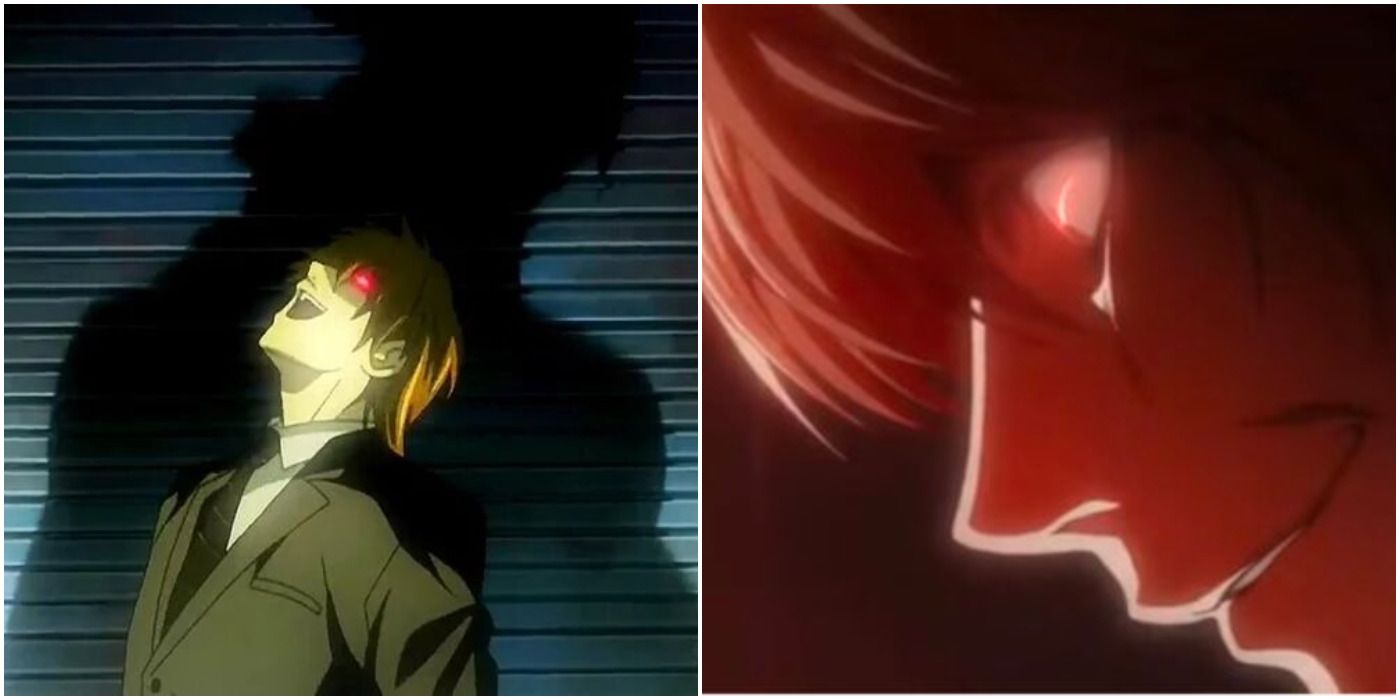
Adaptations and Creators
The brainchild of creators Tsugumi Ōba and Takeshi Obata, the series has been adapted into various forms of media, including an anime series and a live-action film. The television series, helmed by Tetsurō Araki, closely follows the manga’s plot and has become renowned around the world. However, the movie takes a different approach, with mixed reviews from fans. Even so, these adaptations have opened the door to fresh audiences and enabled further examination of its themes and characters. The creators have also expressed their gratitute for the adaptations.
One of the most captivating characters in the series is Light Yagami, whose narcissism plays a key role in his personality. He believes himself to be the only one capable of bringing justice to the world and sees himself as a divine being. This characteristic is further explored throughout the series, raising questions about the influence of power on the human psyche. The creators were driven by the concept of a showdown between two masterminds, and Light’s egotism elevates the complexity of this face-off. Altogether, the various adaptations and the creators’ vision have contributed to its longevity and relevance in pop culture.


Conclusion of Death Note
In conclusion, I personally find Death Note to be an incredibly thought-provoking manga series that skillfully delves into the intricate layers of human nature and morality. What I particularly appreciate is the central figure, Light Yagami, who intricately walks the fine line between portraying a hero and an antihero. This dynamic adds a profound depth to the storyline, prompting me to reflect on the complexities of morality and the consequences of wielding power.
Furthermore, beyond its gripping narrative, I am enamored by the abundance of symbolism and the nuanced references to literature and Christianity embedded throughout the series. These elements not only contribute to the richness of the plot but also elevate the intellectual engagement for me as a reader.
Tetsurō Araki’s direction in the television series adaptation is, in my opinion, masterful. The visual representation and the seamless translation of the manga’s complexities to the screen make it a definite must-watch. It’s a testament to how a skilled adaptation can enhance the impact of an already compelling story.
In my eyes, Death Note transcends being just a thrilling read or watch; it stands as a true masterpiece crafted by the brilliant minds of Tsugumi Oba and Takeshi Obata. The series has left an indelible mark on me, leading to introspection and a questioning of my own beliefs and values. It’s this ability to provoke such personal contemplation that, for me, sets Death Note apart as a timeless and impactful work of art.

